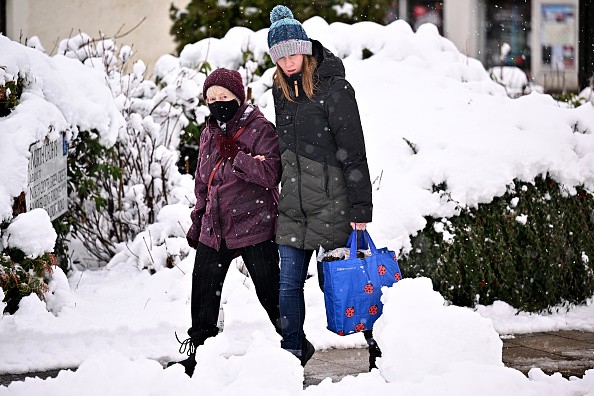Two cross-country storms are expected to make their way across the United States this week, bringing snow, ice, and rain to different parts of the country. AccuWeather meteorologists say both storms are expected to cause significant travel delays.

Impacts from the First Storm
There are two storms this week, but they are not identical but more like fraternal twins, AccuWeather Chief On-Air Meteorologist Bernie Rayno said.
On Monday morning, torrential rain and thunderstorms swept across eastern Texas and Alabama, causing significant damage, as per AccuWeather.
Overnight into Tuesday, severe weather began to develop from middle Texas to central Missouri, posing a threat of tornadoes and other damaging winds. On Tuesday and Tuesday night, these dangerous storms will predominantly affect areas from southern Indiana and Illinois through southern Louisiana and Mississippi.
According to AccuWeather Meteorologist Matt Benz, a wide swath of the Dakotas to northern Michigan will see 6 to 12 inches of snowfall over the next few days. According to Benz, Duluth, Minnesota, will be buried under 1-2 feet of snow.
Washburn, Wisconsin, located east of Duluth, Minnesota, had received almost 20 inches of snow by Tuesday morning.
That there had been any snow at all at this point was viewed as a nice perk. Snow accumulations from the same storm are expected to expand over much of the same areas from Monday night to Tuesday before they begin to diminish over the upper Great Lakes early Wednesday.
Parts of Iowa, the northern half of Missouri, northern Illinois, southern Wisconsin, and a portion of the Lower Peninsula of Michigan will be covered in ice and wintry mix through Tuesday. There will then be an icy buildup in the northern parts of New York and New England beginning on Tuesday and lasting until early Wednesday.
Temperature May Drop Ahead of the Second Storm
According to AccuWeather meteorologists, midweek will see the second of the twin storms move more south and east than the first storm.
Due to the fact that the second storm will be a considerably colder system, the effects of snow and ice will be felt much further south in the Central and Northeast regions.
Temperatures will fall significantly across the Mississippi Valley, Ohio Valley, and mid-Atlantic region ahead of the second storm. In Indianapolis, for example, highs will only reach the low 60s on Tuesday before plummeting to the low 30s on Wednesday and Thursday.
Temperatures in New York City are expected to plummet by 25-30 degrees on Thursday and may fall as low as a few degrees above freezing by Thursday night, following Wednesday's highs in the mid-60s.
Temperatures during the peak of the second storm will determine the extent of snowy precipitation and slippery conditions in these and other cities in the wintry mix zone.
Heavy Rainfall, Flooding Due to the Storms
Direct delays are expected at Denver, St. Louis, Chicago, Detroit, Pittsburgh, New York City, and Boston's major airports due to the second storm's wintry precipitation. Hundreds of regional airports will also be affected by the storm.
Flight delays and cancellations are expected to continue into the weekend as employees and planes are relocated in the wake of the huge storm.
Heavy rain from both storms, especially in northern Louisiana and Pennsylvania, can exacerbate or even cause flooding in small streams and rivers. AccuWeather Local StormMaxTM of 14 inches is possible in this area, with a total rainfall of 2-4 inches expected from both storms.
These areas have already received up to 1-4 inches of rain, which was accompanied by melting snow, late last week. This additional rainfall would add to that total. A few additional inches of rain from either storm could unleash fresh or worse flooding this week in the region's streams and rivers, which are already flowing high.
Related Article : Gusty Winds, Flood Caused by Severe Storms Will Rattle Nebraska to Minnesota, Wisconsin
For more news, updates about storms and similar topics don't forget to follow Nature World News!
© 2025 NatureWorldNews.com All rights reserved. Do not reproduce without permission.





